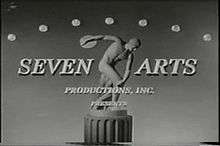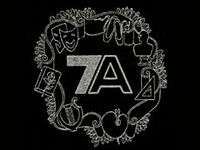Seven Arts Productions
Seven Arts Productions was a production company which made films for release by other studios. It was founded in 1957 by Ray Stark, Eliot Hyman, and Norman Katz.[1]
 Seven Arts Productions first logo (1957–1961) | |
| Industry | Film |
|---|---|
| Genre | Entertainment |
| Fate | merged with Warner Bros. |
| Successor | Warner Bros.-Seven Arts |
| Founded | 1957 |
| Defunct | 1967 |
Key people | Ray Stark Eliot Hyman |
| Parent | Warner Bros.-Seven Arts (1967–1969) |


History
Seven Arts first film was The Gun Runners, released by United Artists.
Among its productions were The Misfits (1961) for United Artists, Gigot (1962) for Twentieth Century-Fox, Lolita (1962) for Metro-Goldwyn-Mayer, What Ever Happened to Baby Jane? (1962) for Warner Bros., and Is Paris Burning? (1966) for Paramount Pictures.
Over time it expanded its role, becoming equity investors with other studios and partnering with British horror film company Hammer Film Productions on many projects. It also retained ancillary rights on new productions surrendered on earlier films, including Seven Days in May (1964) and Promise Her Anything (1965) for release by Paramount.
Seven Arts also distributed feature films and TV programs for television. Warner Bros. licensed the TV rights to its post-1949 library to Seven Arts in 1960. Seven Arts made similar deals with 20th Century Fox and Universal Pictures.[1] Seven Arts also acquired theatrical reissue rights to some Fox films as well.[1]
In 1967, Seven Arts Productions acquired the controlling interest in Warner Bros. Pictures from Jack L. Warner for $32 million.[2] The companies were merged as Warner Bros.-Seven Arts. It was renamed Warner Bros. after Kinney National Company bought the company.
Other uses
Neither the later Seven Arts Pictures nor the defunct releasing company "Seven Arts", an early 1990s joint venture between Carolco Pictures and New Line Cinema (the latter which subsequently merged into Warner Bros.), is related to the original Seven Arts Productions.
Select filmography
- The Gun Runners (1958); with United Artists
- Thunder in the Sun (1959); with Paramount Pictures
- Ten Seconds to Hell (1959); with United Artists
- The Misfits (1961); with United Artists
- By Love Possessed (1961); with United Artists
- West Side Story (1961); with United Artists
- The Count of Monte Cristo (1961)
- The Roman Spring of Mrs Stone (1961)
- Gigot (1962); with Twentieth Century Fox
- Lolita (1962); with MGM
- What Ever Happened to Baby Jane? (1962); with Warner Bros.
- Two for the Seesaw (1962); with United Artists
- The Main Attraction (1962); with MGM
- The Wild Affair (1963); with Bryanston Films & British Lion Films
- Sunday in New York (1963); with MGM
- Rampage (1963); with Warner Bros.
- Tamahine (1963); with MGM
- The Night of the Iguana (1964); with MGM
- Of Human Bondage (1964); with MGM
- Never Put It in Writing (1964); with Allied Artists Pictures
- Seven Days in May (1964); with Paramount Pictures
- A Global Affair (1964); with MGM
- Promise Her Anything (1965); with Paramount Pictures
- The Nanny (1965); with Hammer Films
- The Hill (1965); with MGM
- Is Paris Burning? (1966); with Paramount Pictures
- The Defector (1966)
- Dracula: Prince of Darkness (1966); with Hammer Films
- One Million Years B.C. (1966); with Hammer Films
- The Frozen Dead (1966)
- The Bible: In the Beginning... (1966); with Twentieth Century Fox
- This Property Is Condemned (1966); with Paramount Pictures
- Assault on a Queen (1966); with Paramount Pictures
- Rasputin the Mad Monk (1966); with Hammer Films
- The Reptile (1966); with Hammer Films
- The Plague of the Zombies (1966); with Hammer Films
- You're a Big Boy Now (1966)
- Drop Dead Darling (1966); with Paramount Pictures
- Once Before I Die (1966)
- Slave Girls (1967); with Hammer Films
- Oh Dad, Poor Dad, Mamma's Hung You in the Closet and I'm Feelin' So Sad (1967); with Paramount Pictures
- The Viking Queen (1967); with Hammer Films
- The Dirty Dozen (1967); with MGM
- The Shuttered Room (1967)
- It! (1967)
- A Challenge for Robin Hood (1967); with Hammer Films
- The Anniversary (1968); with Hammer Films
- The Vengeance of She (1968); with Hammer Films
- The Lost Continent (1968); with Hammer Films
- The Devil Rides Out (1968); with Hammer Films
Theatre credits
- The World of Suzie Wong (1958–60)
- Everybody Loves Opal (1961)
- Funny Girl (1964–67)
- Any Wednesday (1964–66)
- The Owl and the Pussycat (1964–65)
References
- Hoyt, Eric (3 July 2014). Hollywood Vault: Film Libraries Before Home Video. Univ of California Press. ISBN 9780520282636.
- Warner Sperling, Cass (Director) (2008). The Brothers Warner (DVD film documentary). Warner Sisters, Inc. Archived from the original on 17 February 2016.